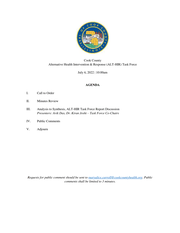Alternative Health Intervention and Response Task Force
Cook County Board of CommissionersRemote
This is a remote meeting. The meeting will be held via Microsoft Teams.
As of this writing, the videoconference link has not yet been posted. Go to this page, click on the July 6 meeting details, then click on the “Click to watch live.” link. You can click “join from web” and “join anonymously” to access the meeting without downloading anything or logging in.
Never post a videoconference link directly directly on Twitter or other social media website, as this can attract Zoombombing/hacking. Instead, you can direct people interested in viewing the meeting to the Legistar page.
See past Documenters coverage of this task force here.
Check the source website for additional information
Reporting
Edited and summarized by the Chicago - IL Documenters Team
State RFP for hospital based crisis stabilization units and Crisis Response System direct action
State RFP for hospital based crisis stabilization units and Crisis Response System direct action

10:57 AM Jul 6, 2022 CDT




































Agency Information
Cook County Board of Commissioners
County Commissioners are elected officials who oversee county activities and work to ensure that citizen concerns are met, federal and state requirements are fulfilled, and county operations run smoothly. The Cook County Board of Commissioners is the governing board and legislative body of the county. It is comprised of 17 Commissioners, each serving a four-year term and is elected from single member districts. Each district represents approximately 300,000 residents. The Board also operates approximately 40 committees and subcommittees chaired by members of Board of Commissioners.
Remote meetings of the Cook County Board of Commissioners are live-streamed at https://www.cookcountyil.gov/service/watch-live-board-proceedings
Learn more or share your own tips about the Cook County Board of Commissioners on the Documenters message board here.
